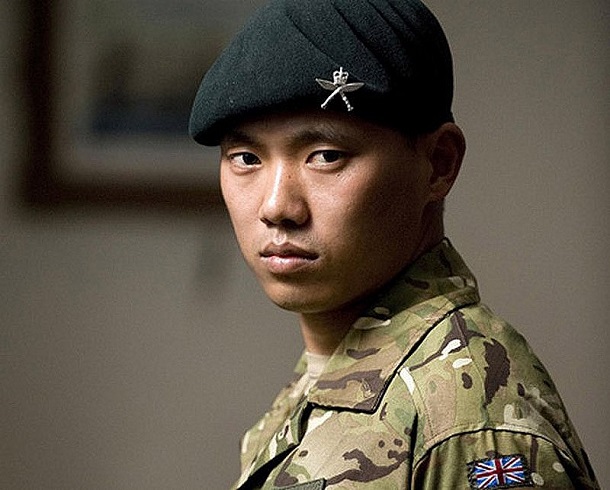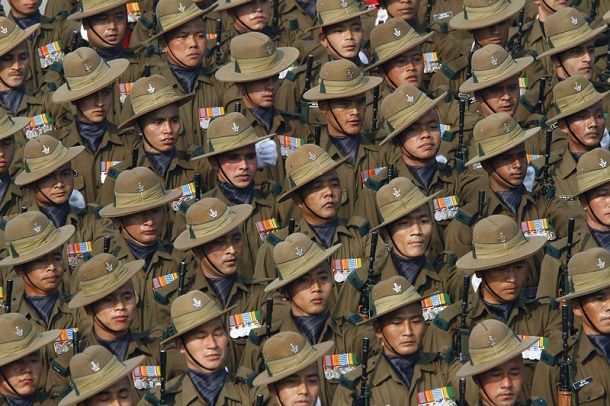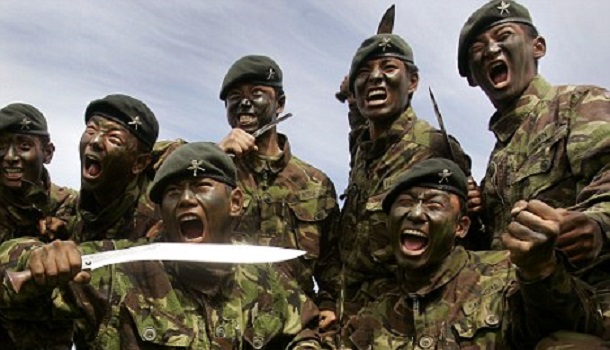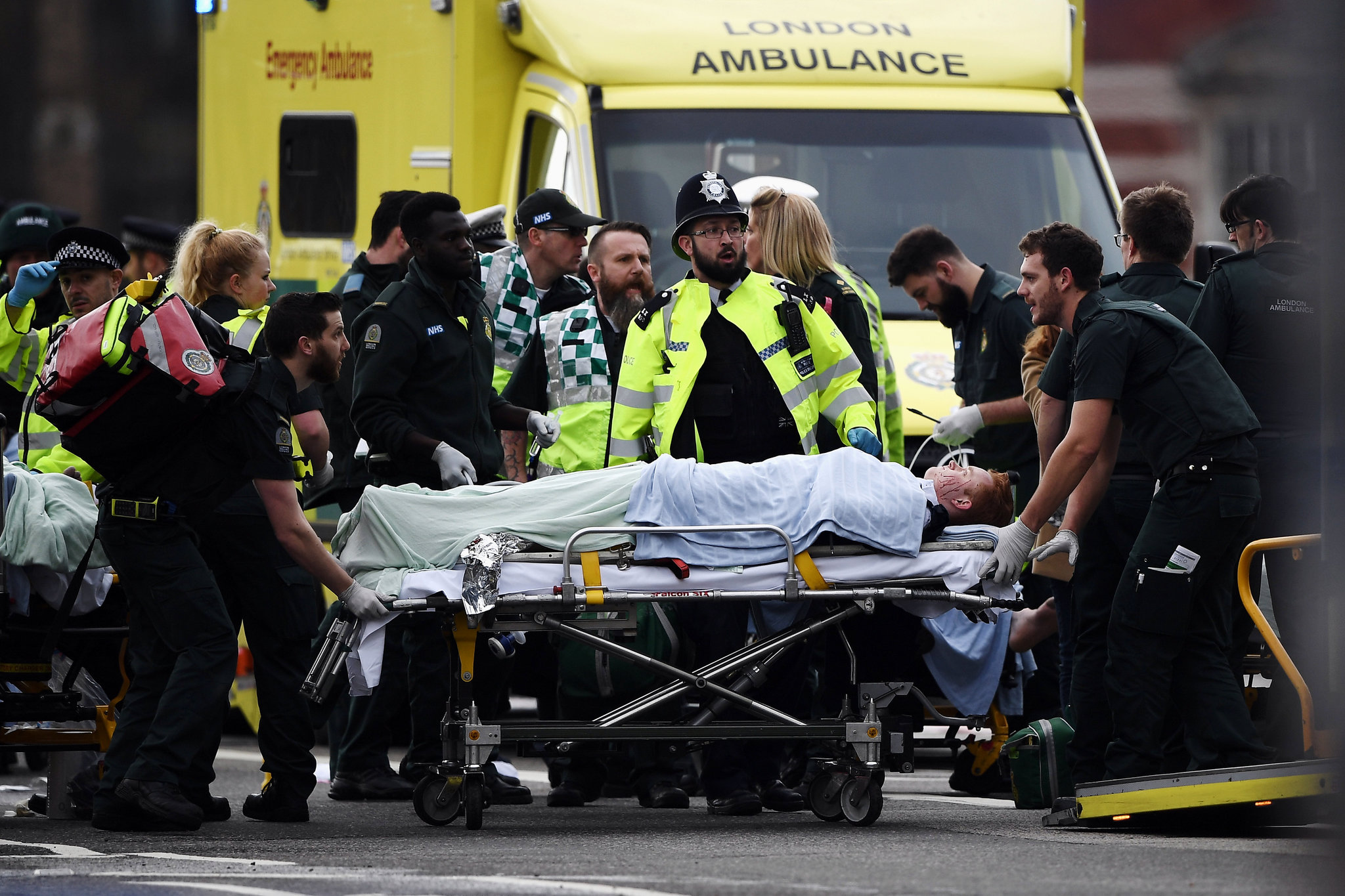Incredible feats! British Gurkha soldier Corporal Dipprasad Pun killed 30 Taliban militants on his own in Afghanistan,hero soldier honored by Queen with Victoria Cross.
A Gurkha soldier who single-handedly defeated more than 30 Taliban fighters has been awarded the Conspicuous Gallantry Cross by the Queen.
Corporal Dipprasad Pun, 31, described how he was spurred on by the belief that he was going to die and so had nothing to lose in taking on the attackers who overran his checkpoint in Afghanistan.
Corporal Pun gallantry award is second only to the Victoria Cross – the highest honour for bravery in the face of the enemy.
Corporal Diprprasad Pun, from the 1st Battalion the Royal Gurkha Rifles, was presented with the CGC during an investiture ceremony at Buckingham Palace, during which a number of other soldiers were recognised for their bravery.
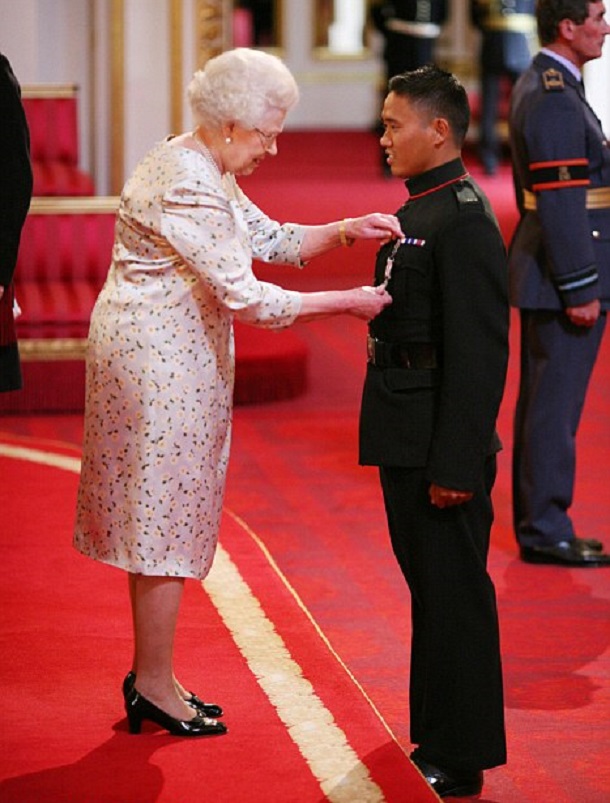
Speaking after receiving the honour from the Her Majesty Queen, the Gurkha said: ‘I’m very excited and happy to here in the Palace to receive the Conspicuous Gallantry Cross. This will be a great memory for the future.’
The soldier fired more than 400 rounds, launched 17 grenades and detonated a mine to thwart the Taliban assault on his checkpoint near Babaji in Helmand Province, southern Afghanistan, last September.
At one point, after exhausting all his ammunition, he had to use the tripod of his machine gun to beat away a militant who was climbing the walls of the compound.
After the ceremony, Cpl Pun was congratulated by investiture guests who queued up to shake his hand.
Speaking about the actions which earned him the CGC, he said: ‘At that time I wasn’t worried, there wasn’t any choice but to fight. The Taliban were all around the checkpoint, I was alone.
‘I had so many of them around me that I thought I was definitely going to die so I thought I’d kill as many of them as I could before they killed me.
‘That incident happened in the middle of my tour and after that I thought nobody can kill us now – when we met the enemy I wasn’t scared.
‘I thought the Taliban did not have the capacity to fight with us.’
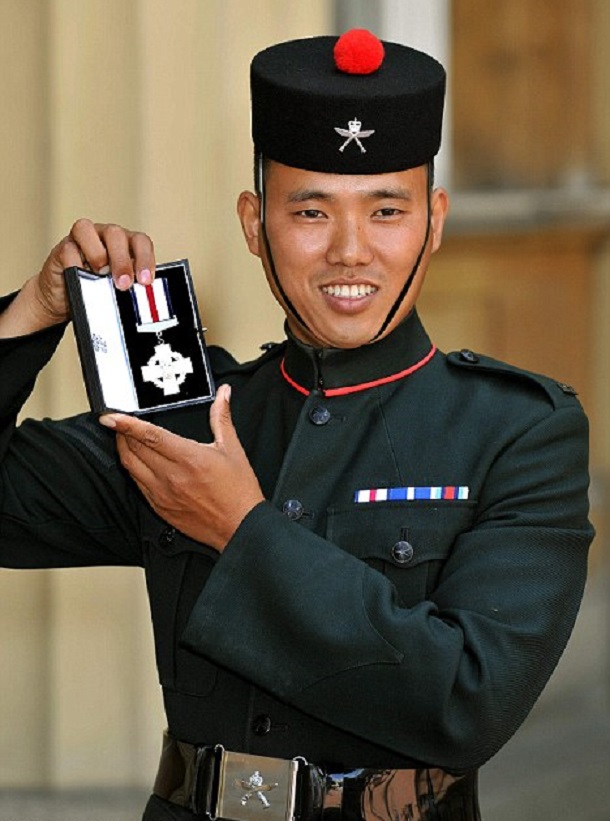
Cpl Pun, an acting sergeant during his Afghan deployment, was on sentry duty at the time of the attack when he heard a clinking noise outside the small base.
At first he thought it might be a donkey or a cow, but when he went to investigate he found two insurgents digging a trench to lay an improvised explosive device (IED) at the checkpoint’s front gate.
He realised that he was completely surrounded and that the Taliban were about to launch a well-planned attempt to overrun the compound.
The enemy opened fire from all sides, destroying the sentry position where the soldier had been on duty minutes before.
Defending the base from the roof, the Gurkha remained under continuous attack from rocket-propelled grenades and AK47s for more than a quarter of an hour.
Most of the militants were about 50ft away from him, but at one point he turned around to see a ‘huge’ Taliban fighter looming over him.
The soldier picked up his machine gun and fired a long burst at the man until he fell off the roof.
When another insurgent tried to climb up to his position, the Gurkha attempted to shoot him with his SA80 rifle. But it did not work, either because it had jammed or because the magazine was empty.
He first grabbed a sandbag but it had not been tied up and the contents fell to the floor.
Then he seized the metal tripod of his machine gun and threw it at the approaching Taliban militant, shouting in Nepali ‘Marchu talai’ (‘I will kill you’) and knocking him down.
Two insurgents were still attacking by the time the heroic Gurkha had used up all his ammunition, but he set off a Claymore mine to repel them.
At this point his company commander, Major Shaun Chandler, arrived at the checkpoint, slapped him on the back and asked if he was OK.
In total he fired off 250 general purpose machine gun rounds, 180 SA80 rounds, six phosphorous grenades, six normal grenades, five underslung grenade launcher rounds and one Claymore mine.
The only weapon he did not use was the traditional Kukri knife carried by Gurkhas because he did not have his with him at the time.
The married soldier, whose father and grandfather were also Gurkhas, is originally from the village of Bima in western Nepal but now lives in Ashford, Kent.
His medal citation said he saved the lives of three comrades at the checkpoint at that time and prevented the position being overrun.
It read: ‘Pun could never know how many enemies were attempting to overcome his position, but he sought them out from all angles despite the danger, consistently moving towards them to reach the best position of attack.’
Major General Nicholas Carter, who was commander of combined forces, including British troops, in southern Afghanistan during Cpl Pun’s deployment, praised the soldier and those from the Mercian Regiment receiving gallantry awards today.
The senior officer, who received the Distinguished Service Order from the Queen for his leadership in the Middle East country, said: ‘Their efforts have been tremendous. It was a privilege to have members of the 1st Battalion Royal Gurkha Rifles and the Mercian Regiment under my command.
‘The Conspicuous Gallantry Cross does not get handed out lightly, it was a most remarkable achievement by that particular young Gurkha.’
Who is Gurkha Soldiers
“Better to die than be a coward” is the motto of the world-famous Nepalese Gurkha soldiers who are an integral part of the British Army.
They still carry into battle their traditional weapon – an 18-inch long curved knife known as the kukri.
In times past, it was said that once a kukri was drawn in battle, it had to “taste blood” – if not, its owner had to cut himself before returning it to its sheath.
Now, the Gurkhas say, it is used mainly for cooking.
The potential of these warriors was first realised by the British at the height of their empire-building in the last century.
The Victorians identified them as a “martial race”, perceiving in them particularly masculine qualities of toughness. Bravest of the brave, most generous of the generous, never had a country more faithful friends than you”
After suffering heavy casualties in the invasion of Nepal, the British East India Company signed a hasty peace deal in 1815, which also allowed it to recruit from the ranks of the former enemy.
Following the partition of India in 1947, an agreement between Nepal, India and Britain meant four Gurkha regiments from the Indian army were transferred to the British Army, eventually becoming the Gurkha Brigade.
Since then, the Gurkhas have loyally fought for the British all over the world, receiving 13 Victoria Crosses between them.
More than 200,000 fought in the two world wars, and in the past 50 years they have served in Hong Kong, Malaysia, Borneo, Cyprus, the Falklands, Kosovo and now in Iraq and Afghanistan.
They serve in a variety of roles, mainly in the infantry but with significant numbers of engineers, logisticians and signals specialists.
The name “Gurkha” comes from the hill town of Gorkha from which the Nepalese kingdom had expanded.
The ranks have always been dominated by four ethnic groups, the Gurungs and Magars from central Nepal, the Rais and Limbus from the east, who live in villages of impoverished hill farmers.
They keep to their Nepalese customs and beliefs, and the brigade follows religious festivals such as Dashain, in which – in Nepal, not the UK – goats and buffaloes are sacrificed.
But their numbers have been sharply reduced from a World War II peak of 112,000 men, and now stand at about 3,500.
During the two world wars 43,000 men lost their lives.
The Gurkhas are now based at Shorncliffe near Folkestone, Kent – but they do not become British citizens.
The soldiers are still selected from young men living in the hills of Nepal – with about 28,000 youths tackling the selection procedure for just over 200 places each year.
The selection process has been described as one of the toughest in the world and is fiercely contested.
Young hopefuls have to run uphill for 40 minutes carrying a wicker basket on their back filled with rocks weighing 70lbs.
They are tough, they are brave, they are durable, they are amenable to discipline.”
Tony GouldHistorian
Prince Harry lived with a Gurkha battalion during his 10 weeks in Afghanistan.
There is said to be a cultural affinity between Gurkhas and the Afghan people which is beneficial to the British Army effort there.
Historian Tony Gould said Gurkhas have brought an excellent combination of qualities from a military point of view.
He said: “They are tough, they are brave, they are durable, they are amenable to discipline.
“They have another quality which you could say some British regiments had in the past, but it’s doubtful that they have now, that is a strong family tradition.
“So that within each battalion there were usually very, very close family links, so when they were fighting, they were not so much fighting for their officers or the cause but for their friends and family.”
Historically, Gurkhas who had served their time in the Army – a maximum of 30 years, and a minimum of 15 to secure a pension – were discharged back to Nepal.
But last year, all retired Gurkhas won the right to live in the UK, following a high-profile campaign led by actress Joanna Lumley, whose father served with the 6th Gurkha Rifles.
Gurkha veterans have also continued to fight for equal pensions with the soldiers they served alongside.
In 2007, they won a partial victory when pension rules were changed to give serving Gurkha soldiers equal pension rights with other service personnel in the UK.
But the British Gurkha Welfare Society said about 25,000 men who had retired before 1 July 1997 were denied the opportunity to transfer into UK armed forces pension schemes.
It said the government had acted unlawfully by paying them a third of the income of UK-based soldiers, and vowed to fight on.
A High Court test case in January 2010 ruled in favour of the Ministry of Defence, which argued the pension cut-off date was “justified and proportionate”.
That decision has since been challenged by the Gurkhas, who have taken their battle to the Court of Appeal.
[adrotate group=”14″]

